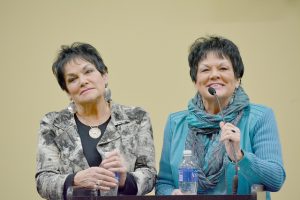
Elizabeth Pulanco/Winonan
In honor of Native American Heritage Month, Winona State University invited twins Dr. Kay McGowan and Dr. Fay Givens to give a presentation about their work with the United Nations and their creation of the Declaration for the Rights of Indigenous People.
While growing up, the sisters and their family were forced off their Mississippi Choctaw reservation and into the city, where they had to quickly adapt to a new lifestyle in order to survive.
This experience helped inspire their activism and devotion to making a difference.
“Injustice is the driving force behind what we do,” Givens said.
As more tribes began moving into cities, they began setting up support systems within Indian centers.
Givens is currently the executive director of American Indian Services Inc., an Indian center in Michigan. These centers provide legal assistance, therapy and addiction treatment for Native American populations in need. The Indian centers also provide support for survivors of Native American boarding schools.
For over 150 years, Native American children were sent to go to boarding schools as a form of assimilation into the dominant American culture.
Givens and McGowan created a film documenting the experiences of these children and spoke to survivors.
“When the children would return home from the boarding schools, they were strangers to their own families,” Givens said.
While working on their documentary about the boarding school experience, Givens and McGowan were also working on the creation of the Declaration for the Rights of Indigenous People.
McGowan had worked with the U.N. at the Fourth World Conference on Women before becoming involved with the declaration.
“Five percent of the world’s population is made up of indigenous people from 70 different countries,” McGowan said. “They have little to no voice within the international community.”
Not only did the declaration help give a voice to the indigenous people of the world, but it also created different positions representing indigenous people within the U.N.
One of these positions is the office of the special rapporteur, who is in charge of promoting new laws between nations that promote the rights of indigenous and first nations people.
Givens and McGowan believe going through the U.N. is the best way to secure the rights of indigenous people because native groups still face discrimination within their own countries.
“We have to take our issues to the U.N., because we can’t receive fair treatment in the United States,” McGowan said.
This September marked the eighth year of the passing of the Declaration for the Rights of Indigenous People.
As the declaration was being developed, many different indigenous people came out of the woodwork from various countries. McGowan and Givens worked with several different indigenous people to write the declaration. Several meetings were held while the declaration was being prepared.
“Representatives from Japan came to the meetings, saying they didn’t have any indigenous people,” said Givens. “The next meeting, the Ainu introduced themselves as the indigenous group of Japan.”
When the declaration was first brought to the U.N., 144 countries approved it.
Canada, the U.S., Australia and New Zealand were the only countries to vote against the treaty. The four countries eventually signed the treaty, but only after protest from their indigenous groups.
With the passing of the declaration, progress has been made across the world on protecting the rights of indigenous people.
“Guatemala, Nicaragua and many Scandinavian countries have incorporated the declaration into their legal systems,” McGowan said.
Countries such as Japan and Australia have publicly recognized and apologized to the indigenous groups in their countries.
Native Americans in the U.S. have benefited from the declaration as well. In 2012, a burial ground land that had been owned by the government was returned to the Mississippi Choctaw, and 91,000 acres of land have been returned to a tribe in Washington.
As McGowan and Givens continue their activism, they recognize a lack of awareness for issues facing indigenous people. When they talk about these issues in front of the U.N., they find themselves playing the role of educators.
“If we don’t bring the issues to the U.N., they won’t hear about them,” Givens said.
Sophomore Ivy Cannella was thankful for the opportunity to learn about the issues facing the Native American and indigenous people community.
“Being from a small town, it is good to hear about these diverse topics,” Cannella said.
As the sisters move forward in their activism, they still have more causes to discuss.
“We want to focus on domestic violence, especially violence against indigenous women,” McGowan said. “There has been some progress, but it doesn’t move fast enough for us.”
Throughout their careers, the sisters have made it a goal to not only help indigenous groups in the U.S. but all over the world. Even after all they have accomplished, the sisters are still pushing for more change.
“I wish we there were more of us,” Givens said. “We can never do enough.”










































